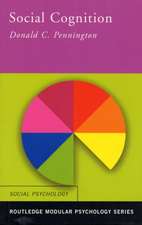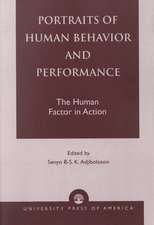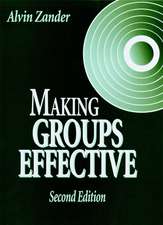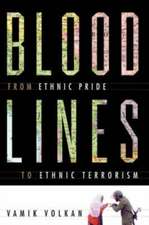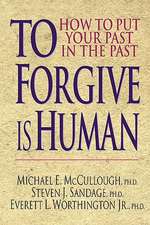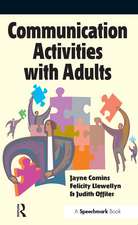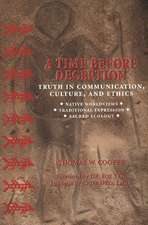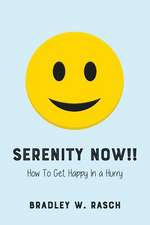Deviant Behavior
Autor Edward J. Clarke, Delos H. Kellyen Limba Engleză Paperback – 31 oct 2007
Preț: 417.34 lei
Preț vechi: 621.64 lei
-33% Nou
Puncte Express: 626
Preț estimativ în valută:
79.85€ • 83.38$ • 65.94£
79.85€ • 83.38$ • 65.94£
Carte disponibilă
Livrare economică 25 martie-08 aprilie
Preluare comenzi: 021 569.72.76
Specificații
ISBN-13: 9781429205184
ISBN-10: 1429205180
Pagini: 704
Dimensiuni: 159 x 232 x 34 mm
Greutate: 1.04 kg
Ediția:Revizuită
Editura: Worth Publishers
Locul publicării:New York, United States
ISBN-10: 1429205180
Pagini: 704
Dimensiuni: 159 x 232 x 34 mm
Greutate: 1.04 kg
Ediția:Revizuită
Editura: Worth Publishers
Locul publicării:New York, United States
Cuprins
Part I: Creating Deviance
Conceptions, Entrepreneurs, and Power
1. Conceptions of Deviant Behavior: The Old and New, Jack P. Gibbs
*2. Using an Integrated Typology of Deviance to Analyze Ten Common Norms of the U.S. Middle Class, Alex Heckert, Druann Maria Heckert
3. Moral Entrepreneurs: The Creation and Enforcement of Deviant Categories, Howard S. Becker
The Production of Deviant Categories and Actors
4. Blowing Smoke: Status Politics and the Shasta County Smoking Ban, Justin L. Tuggle, Malcolm D. Holmes
5. The Production of Deviance in Capitalist Society, Steven Spitzer
6. The Discovery of Hyperkinesis: Notes on the Medicalization of Deviant Behavior, Peter Conrad
Part II: Understanding Deviance: Theories and Perspectives
The Functionalist Perspective
7. The Normal and the Pathological, Emile Durkheim
8. On the Sociology of Deviance, Kai T. Erickson
The Conflict Perspective
9. The Conflict of Conduct Norms, Thorsten Sellin
10. Differential Punishing of African Americans and Whites Who Possess Drugs: A Just Policy or a Continuation of the Past? Rudolph Alexander, Jr., Jacquelyn Gyamerah
Cultural Transmission/Social Learning Theory
11. Techniques of Neutralization: A Theory of Delinquency, Gresham M. Sykes, David Matza
12. The Influence of Situational Ethics on Cheating Among College Students, Donald L. McCabe
Opportunity Theory
13. Social Structure and Anomie, Robert K. Merton
14. Homeboys, Dope Fiends, Legits, and New Jacks, John M. Hagedorn
Control Theory
15. A Control Theory of Delinquency, Travis Hirschi
*16. Heavy Episodic Drinking Among Adolescents: A Test of Hypotheses Derived from Control Theory, Barbara J. Costello, Bradley J. Anderson, Michael D. Stein
The Interactionist, Societal Reactions, or Labeling Perspective
17. Career Deviance, Howard S. Becker
18. Definition and the Dramatization of Evil, Frank Tannenbaum
An Integrated Approach
19. Commitment, Deviance, and Social Control, Jeffrey T. Ulmer
*20. Juvenile Delinquency Under Conditions of Rapid Social Change, Klaus Boehnke, Dagmar Bergs-Winkels
Part III Becoming Deviant
Private Domains, Information Control, and Accommodation
21. Information Control and Personal Identity: The Discredited and the Discreditable, Erving Goffman
*22. Conceptualizing Stigma, Bruce G. Link, Jo C. Phelan
*23. The Consequences of Antisocial Behavior in Older Male Siblings for Younger Brothers and Sisters, Jim Snyder, Lew Bank, Bert Burraston
24. Examining the Informal Sanctioning of Deviance in a Chat Room Culture, Ronda D. Evans
Part IV The Production of Institutional Careers and Identities
Organizational Structures, Ideologies, Social-Control Agents, and Recruitment: The Institutional Backdrop
25. Bureaucratic Slots and Client Processing, Delos H. Kelley
26. The Corporate Context of Private Prisons, David Shichor
*27. The Enforcement of Norms: Group Cohesion and Meta-Norms, Christine Horne
Social-Control Agents and the Application of Diagnostic Stereotypes: The Beginning Destruction of Public Identity
28. The Epistemological Challenge of the Early Attack on 'Rate Construction,' Troy Duster
29. The Organizational Career of Gang Statistics: The Politics of Policing Gangs, Albert J. Meehan
*30. Trial by Fire: Media Constructions of Corporate Deviance, Gray Cavender, Aogan Mulcahy
Social-Control Agents, Sanctioning, and the Production of Institutional Careers and Identities
31. Criminalizing Women's Behavior, Nora S. Gustavsson, Ann E. MacEachron
32. Medicalizing Homelessness: The Production of Self-Blame and Self-Governing within Homeless Shelters, Vincent Lyon-Callo
Managing Institutional Careers and Identities
33. The Moral Career of the Mental Patient, Erving Goffman
34. Suspended Identity: Identity Transformation in a Maximum Security Prison, Thomas J. Schmid, Richard S. Jones
Part V Building Deviant Careers and Identities
Organizational Structures, Ideologies, and Recruitment: The Noninstitutional Backdrop
35. The Social Organization of Deviants, Joel Best, David F. Luckenbill
36. Managing the Action: Sports Bookmakers as Entrepreneurs, Phyllis Coontz
Entering and Learning Deviant Cultures and Practices: The Building of Deviant Careers and Identities
37. Drifting into Dealing: Becoming a Cocaine Seller, Sheigla Murphy, Dan Waldorf, Craig Reinarman
*38. Self-Control, Peer Relations, and Delinquency, Constance L. Chapple Deviant Careers and Identities: Some Additional Forms and Shapes—Peers, Gangs, and Organizations
*39. Differential Association, Multiple Normative Standards, and the Increasing Incidence of Corporate Deviance in an Era of Globalization, Verghese Chirayath, Kenneth Eslinger, Ernest De Zolt
40. Corporations, Organized Crime, and the Disposal of Hazardous Waste: An Examination of the Making of a Criminogenic Regulatory Structure, Andrew Szasz
Managing Deviant Careers and Identities
41. Is the Street Child Phenomenon Synonymous with Deviant Behavior?, Johann le Roux, Cheryl Sylvia Smith
*42. Being Middle Eastern American: Identity Negotiation in the Context of the War on Terror, Amir Marvasti
Part VI Changing Deviance
Transforming Deviance: Conceptions, Actors, and Organizations
43. Reform the Law: Decriminalization, Samuel Walker
44. The Professional Ex-: An Alternative for Exiting the Deviant Career, J. David Brown
45. Race and Policing, Jim Leitzel
Conceptions, Entrepreneurs, and Power
1. Conceptions of Deviant Behavior: The Old and New, Jack P. Gibbs
*2. Using an Integrated Typology of Deviance to Analyze Ten Common Norms of the U.S. Middle Class, Alex Heckert, Druann Maria Heckert
3. Moral Entrepreneurs: The Creation and Enforcement of Deviant Categories, Howard S. Becker
The Production of Deviant Categories and Actors
4. Blowing Smoke: Status Politics and the Shasta County Smoking Ban, Justin L. Tuggle, Malcolm D. Holmes
5. The Production of Deviance in Capitalist Society, Steven Spitzer
6. The Discovery of Hyperkinesis: Notes on the Medicalization of Deviant Behavior, Peter Conrad
Part II: Understanding Deviance: Theories and Perspectives
The Functionalist Perspective
7. The Normal and the Pathological, Emile Durkheim
8. On the Sociology of Deviance, Kai T. Erickson
The Conflict Perspective
9. The Conflict of Conduct Norms, Thorsten Sellin
10. Differential Punishing of African Americans and Whites Who Possess Drugs: A Just Policy or a Continuation of the Past? Rudolph Alexander, Jr., Jacquelyn Gyamerah
Cultural Transmission/Social Learning Theory
11. Techniques of Neutralization: A Theory of Delinquency, Gresham M. Sykes, David Matza
12. The Influence of Situational Ethics on Cheating Among College Students, Donald L. McCabe
Opportunity Theory
13. Social Structure and Anomie, Robert K. Merton
14. Homeboys, Dope Fiends, Legits, and New Jacks, John M. Hagedorn
Control Theory
15. A Control Theory of Delinquency, Travis Hirschi
*16. Heavy Episodic Drinking Among Adolescents: A Test of Hypotheses Derived from Control Theory, Barbara J. Costello, Bradley J. Anderson, Michael D. Stein
The Interactionist, Societal Reactions, or Labeling Perspective
17. Career Deviance, Howard S. Becker
18. Definition and the Dramatization of Evil, Frank Tannenbaum
An Integrated Approach
19. Commitment, Deviance, and Social Control, Jeffrey T. Ulmer
*20. Juvenile Delinquency Under Conditions of Rapid Social Change, Klaus Boehnke, Dagmar Bergs-Winkels
Part III Becoming Deviant
Private Domains, Information Control, and Accommodation
21. Information Control and Personal Identity: The Discredited and the Discreditable, Erving Goffman
*22. Conceptualizing Stigma, Bruce G. Link, Jo C. Phelan
*23. The Consequences of Antisocial Behavior in Older Male Siblings for Younger Brothers and Sisters, Jim Snyder, Lew Bank, Bert Burraston
24. Examining the Informal Sanctioning of Deviance in a Chat Room Culture, Ronda D. Evans
Part IV The Production of Institutional Careers and Identities
Organizational Structures, Ideologies, Social-Control Agents, and Recruitment: The Institutional Backdrop
25. Bureaucratic Slots and Client Processing, Delos H. Kelley
26. The Corporate Context of Private Prisons, David Shichor
*27. The Enforcement of Norms: Group Cohesion and Meta-Norms, Christine Horne
Social-Control Agents and the Application of Diagnostic Stereotypes: The Beginning Destruction of Public Identity
28. The Epistemological Challenge of the Early Attack on 'Rate Construction,' Troy Duster
29. The Organizational Career of Gang Statistics: The Politics of Policing Gangs, Albert J. Meehan
*30. Trial by Fire: Media Constructions of Corporate Deviance, Gray Cavender, Aogan Mulcahy
Social-Control Agents, Sanctioning, and the Production of Institutional Careers and Identities
31. Criminalizing Women's Behavior, Nora S. Gustavsson, Ann E. MacEachron
32. Medicalizing Homelessness: The Production of Self-Blame and Self-Governing within Homeless Shelters, Vincent Lyon-Callo
Managing Institutional Careers and Identities
33. The Moral Career of the Mental Patient, Erving Goffman
34. Suspended Identity: Identity Transformation in a Maximum Security Prison, Thomas J. Schmid, Richard S. Jones
Part V Building Deviant Careers and Identities
Organizational Structures, Ideologies, and Recruitment: The Noninstitutional Backdrop
35. The Social Organization of Deviants, Joel Best, David F. Luckenbill
36. Managing the Action: Sports Bookmakers as Entrepreneurs, Phyllis Coontz
Entering and Learning Deviant Cultures and Practices: The Building of Deviant Careers and Identities
37. Drifting into Dealing: Becoming a Cocaine Seller, Sheigla Murphy, Dan Waldorf, Craig Reinarman
*38. Self-Control, Peer Relations, and Delinquency, Constance L. Chapple Deviant Careers and Identities: Some Additional Forms and Shapes—Peers, Gangs, and Organizations
*39. Differential Association, Multiple Normative Standards, and the Increasing Incidence of Corporate Deviance in an Era of Globalization, Verghese Chirayath, Kenneth Eslinger, Ernest De Zolt
40. Corporations, Organized Crime, and the Disposal of Hazardous Waste: An Examination of the Making of a Criminogenic Regulatory Structure, Andrew Szasz
Managing Deviant Careers and Identities
41. Is the Street Child Phenomenon Synonymous with Deviant Behavior?, Johann le Roux, Cheryl Sylvia Smith
*42. Being Middle Eastern American: Identity Negotiation in the Context of the War on Terror, Amir Marvasti
Part VI Changing Deviance
Transforming Deviance: Conceptions, Actors, and Organizations
43. Reform the Law: Decriminalization, Samuel Walker
44. The Professional Ex-: An Alternative for Exiting the Deviant Career, J. David Brown
45. Race and Policing, Jim Leitzel
Recenzii
'The various editions of Deviant Behavior have… long been the best deviance readers on the market, going back to the late 1980s. They have the most complete coverage, most logical organization, and the readings are not 'abridged' so heavily that they lose their coherence or complexity.' - Jeffrey Ulmer, Pennsylvania State University, USA.
'The conceptual and theoretical information presented in this reader is unmatched by any I have seen on the market today' - Ryan Schroeder, University of Louisville, USA.
'I use Deviant Behavior because it is the best text I've found that combines classical theories, and studies exploring methodology and findings…The book includes classical and modern thinkers in sociology, and I think students are well-grounded after studying the readings…. It is still the best and most accessible text for college students.' - Elizabeth Callaghan, Ithaca College, USA.
'The various editions of Deviant Behavior have... long been the best deviance readers on the market, going back to the late 1980s. They have the most complete coverage, most logical organization, and the readings are not 'abridged' so heavily that they lose their coherence or complexity.' - Jeffrey Ulmer, Pennsylvania State University, USA.'The conceptual and theoretical information presented in this reader is unmatched by any I have seen on the market today' - Ryan Schroeder, University of Louisville, USA.'I use Deviant Behavior because it is the best text I've found that combines classical theories, and studies exploring methodology and findings...The book includes classical and modern thinkers in sociology, and I think students are well-grounded after studying the readings.... It is still the best and most accessible text for college students.' - Elizabeth Callaghan, Ithaca College, USA.
'The conceptual and theoretical information presented in this reader is unmatched by any I have seen on the market today' - Ryan Schroeder, University of Louisville, USA.
'I use Deviant Behavior because it is the best text I've found that combines classical theories, and studies exploring methodology and findings…The book includes classical and modern thinkers in sociology, and I think students are well-grounded after studying the readings…. It is still the best and most accessible text for college students.' - Elizabeth Callaghan, Ithaca College, USA.
'The various editions of Deviant Behavior have... long been the best deviance readers on the market, going back to the late 1980s. They have the most complete coverage, most logical organization, and the readings are not 'abridged' so heavily that they lose their coherence or complexity.' - Jeffrey Ulmer, Pennsylvania State University, USA.'The conceptual and theoretical information presented in this reader is unmatched by any I have seen on the market today' - Ryan Schroeder, University of Louisville, USA.'I use Deviant Behavior because it is the best text I've found that combines classical theories, and studies exploring methodology and findings...The book includes classical and modern thinkers in sociology, and I think students are well-grounded after studying the readings.... It is still the best and most accessible text for college students.' - Elizabeth Callaghan, Ithaca College, USA.
Notă biografică
EDWARD J. CLARKE, Vanguard University, USA
DELOS H. KELLY, California State University, Los Angeles, USA
DELOS H. KELLY, California State University, Los Angeles, USA
Caracteristici
1 Wide selection of readings
2 Updated to include recent viewpoints
2 Updated to include recent viewpoints




